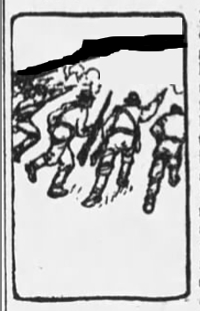
A Generation After
Or,
A Luzon Memorial Day

The third soldier on the left was gray and old. His hair was short and thin, and his face was seamed by a thousand little wrinkles, crossing each other in a fine network. But there was nothing decrepit about his figure, which was spare, nervous and strong like that of an athlete. Even when he lay at rest his muscles were drawn and ready like those of a panther about to spring. He wore a faded uniform, and every line and angle about him marked the American regular soldier, alert and self reliant.
On their right lay a little village of huts, now lone and deserted, and from the dense tropical jungle on their left came the sound of the enemy’s trumpet. The old soldier turned a little farther over on his side and, taking from his pocket a twist of tobacco, cut off a piece with his clasp knife and offered it to the young man beside him. When the youth declined it, the regular shook his head gravely and said:
“You made a mistake, Jarvis. Tobacco is good for a soldier’s nerves, and when he can’t get anything to eat it’s a wonderful sustainer of strength.”
Then he put the piece in his own mouth and chewed with great composure and satisfaction.
The note of the trumpet, faint and far, came again, but the regular took no notice until the youth shifted restlessly and attempted to peer over a clump of thorn bushes in the direction of the sound. Then he laid two strong hands upon his comrade’s blouse and quietly pulled him down.
“Don’t do that,” he said without anger, “because a Mauser bullet might come along, and then Private Jarvis of the Fourth infantry would need no more rations. You see, it wouldn’t be fair to the government, which has fed you and clothed and paid you, to waste your life in such a manner.”
“I don’t like this kind of war,” said Private Jarvis impatiently. “Half the time I’m floundering in a thorn bush, and the other half I’m in the black mud of a swamp up to my waist, while the enemy is sneaking through the bushes with his Mauser ready to pot us.”
“That’s so,” replied the regular. “War ain’t a picnic anywhere, least of all here, where it’s so hot and you’ve got to find the enemy and then catch him and hold him before you can lick him. Now, it was hot down there in Cuba when we went up the hill at San Juan, with the Spaniards blazing away at us like mad, but the Spaniard when he got his licking took it and quit, and we became good friends. Now, here—”
He stopped suddenly, they heard far off in the jungle the sound of a crackling rifle fire.
“It’s our skirmishers driving the enemy back on his own earthworks,” said the regular. “They’re clearing the brush—doing the light work. The heavy job’s got to wait, and we’re not wanted yet. It’s slow work, this lying here in the sun. I wonder what they are doing back in the States.”
The boy Jarvis was silent for a moment, and then his eyes gleamed.
“I know what they are doing—at least in my part of the country,” he said. Don’t you know what day this is, Wilson?”
The regular shook his head.
“How do you expect a fellow to keep track of time,” he said, “when for days and days he’s been following the little brown men in a Luzon jungle? We don’t have a chance to rest and sleep, much less trying to think what day of the week it is.”
“But I remember,” said Jarvis. “It’s the 30th of May, and it’s Decoration day, the day when we remember those who fell in the Civil War. Say, Wilson, over there in my home, way up in old York state by Lake Ontario, all the women are out today putting flowers on the graves of the old soldiers. The pretty girls are along, too, God bless ’em! I can see their blue eyes and brown hair and red cheeks now. It isn’t so sad, you know; that war was such a long time ago that all the sting of it has passed. It was fought before I was born, and we just feel that they were all heroes together. We glory in ’em, and the grief is gone. You know how it is, Wilson?”
“Yes, I know how it is,” replied the regular.
There was a sudden increase in the firing of the skirmishers and Wilson appeared to be listening intently, but his thoughts were far away and in a time long past. His face was too brown and seamed to show emotion, but there was a faint suspicion of a mist in his eyes.